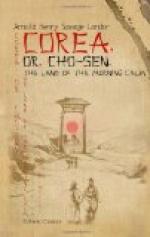But let us now continue our journey towards Seoul. Here several coolies are to be seen approaching us, carrying heavy loads on their backs. A man of a higher position follows them. And, strange circumstance! they are carrying money. Yes; one, two, three, four, five, six, seven, eight—yes, actually eight men, bent under heavy loads of coins. Your first idea, I suppose, will be that these men are carrying a whole fortune—but, oh dear! no. You must know that the currency in Corea is entirely brass, and these brass coins, which go by the name of cash are round coins about the size of a halfpenny, with a square hole in the centre, by which they are strung together, generally a hundred at a time. There are usually as many as two thousand to two thousand eight hundred cash to a Mexican dollar, the equivalent of which is at present about two shillings; you can, therefore, easily imagine what the weight of one’s purse is if it contains even so small a sum as a pennyworth in Corean currency. Should you, however, be under an obligation to pay a sum of, say, L10 or L20, the hire of two oxen or six or eight coolies becomes an absolute necessity, for a sum which takes no room in one’s letter-case if in Bank of England notes, occupies a roomful of hard and heavy metal in the country of the Morning Calm. Great trouble has been and is continually experienced in the kingdom owing to the lack of gold and silver coins; but to the Corean mind to make coins out of gold and to let them go out of the country amounts to the same thing as willingly trying to impoverish the fatherland of the treasures it possesses; wherefore, although rich gold-mines are to be found in Cho-sen, coins of the precious metal are not struck for the above-mentioned reason.
[Illustration: COOLIES’ ARRANGEMENT FOR CARRYING LOADS]
So much for Corean political economy. The coins used are of different sizes and value. They range, if I remember right, from two cash to five, and an examination of a handful of them will reveal the fact that they have been struck off at different epochs. There is the so-called current treasure coin of Cho-sen, one of the more modern kinds, as well as the older coin of Korai, the Ko-ka; while another coin, which seems to have been struck off in the Eastern provinces, is probably as old as any of these, and is still occasionally found in use. The coins, as I have said, are strung together by the hundred on a straw rope; a knot is tied when this number is




